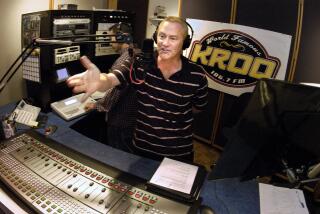KIQQ-FM KICKS ROCK FOR CHANGEOVER TO ‘LITE 100’
- Share via
KIQQ-FM(100.3), one of the four hard-core Top 40 rockers in the Los Angeles market, officially died this week.
The call letters remain the same for the time being, according to new general manager Tom Mosher, but virtually everything else has changed, beginning with the music it plays and the audience it hopes to court.
“We’re still KIQQ, but the format we’re now referring to as ‘Lite-100,’ ” Mosher said.
The music, syndicated as Format 41 to stations across the United States, is “everything from Kenny Rogers to Paul Anka to Perry Como to Olivia Newton-John to B. J. Thomas,” according to Mosher. It is designed to appeal to an older middle-class audience that currently has no station focusing on its kind of music, Mosher said.
That leaves the Top 40 market in Los Angeles to teeny-bopper KKHR-FM (93.1) and the more adult-oriented Top 40 KIIS-FM (102.7) and KMGG-FM (105.9).
“It fills a void. It’s a different sound than you get on KOST, where the median listener age is about 35 or 36,” he said. “This format is designed to lure some of the KOST-FM (103.5) audience, the lower end of the KBIG-FM (104.3) and KJOI-FM (98.7) demographic and also some of the KRTH-FM (101.1) and KHTZ-FM (97.1) audience.”
The only on-air personality remaining on the KIQQ staff is afternoon drivetime deejay Jim Carson, Mosher said. The morning team of Bruce Chandler and Tony St. James, along with former program director Paula Matthews, general manager George Wilson and several other staff members, were out as of Monday.
In keeping with the Lite-100 format, Mosher says the station will now carry “light local news updates in the morning and live local traffic and weather.”
The ax fell after several years of listener ratings that declined as steadily as they were climbing at KIIS-FM. In the most recent quarterly Arbitron Ratings, KIQQ had dipped from 15th to 25th in Los Angeles, with only a 1.5% share of the L.A. listening market.
Asked if the dismal ratings had any bearing on the decision to change formats, Mosher said:
“Well, let’s say that if we had a 10 share in the Arbitron, we wouldn’t have changed.”
More to Read
The biggest entertainment stories
Get our big stories about Hollywood, film, television, music, arts, culture and more right in your inbox as soon as they publish.
You may occasionally receive promotional content from the Los Angeles Times.









